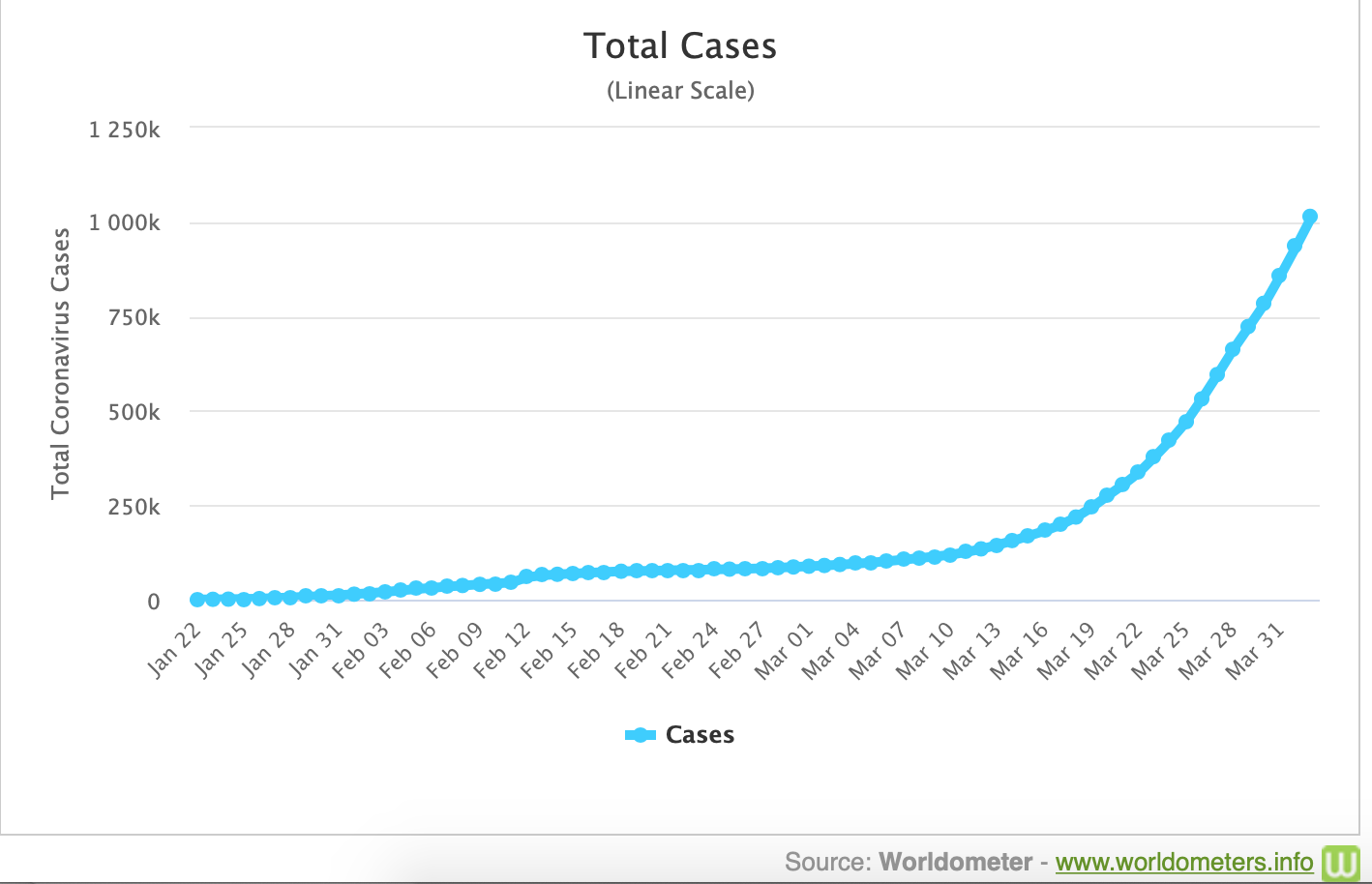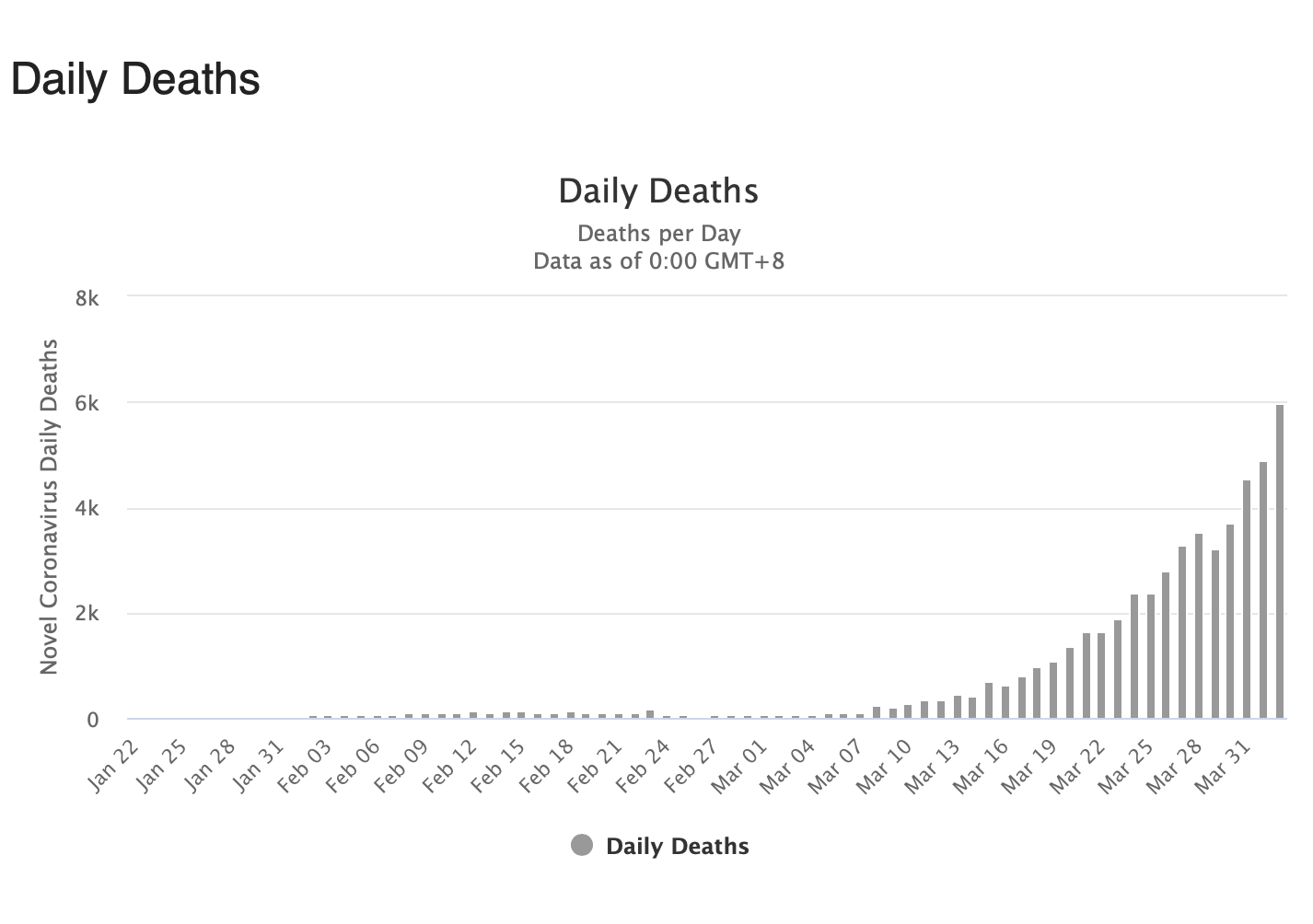One million coronavirus cases: what the figures tell us
Data suggests that most people will recover but death rates are still accelerating

A free daily email with the biggest news stories of the day – and the best features from TheWeek.com
You are now subscribed
Your newsletter sign-up was successful
The number of confirmed coronavirus infections around the world has passed the million mark, with the global total doubling in a week.
More than 1,030,000 infections have been confirmed worldwide, and more than 55,000 deaths, according to the latest figures.
As we pass yet another grim milestone, what can we learn from the numbers?
The Week
Escape your echo chamber. Get the facts behind the news, plus analysis from multiple perspectives.

Sign up for The Week's Free Newsletters
From our morning news briefing to a weekly Good News Newsletter, get the best of The Week delivered directly to your inbox.
From our morning news briefing to a weekly Good News Newsletter, get the best of The Week delivered directly to your inbox.
Recovery rates
The number of people recovering from recorded cases of the virus far outweigh the number of people dying because of it.
Of the 275,000 cases with a closed outcome, 220,000 (80%) recovered compared to 55,000 who died, according to the website Worldometer.
The actual death rate from the virus is far lower than 20%, but because in many countries – including the UK – only very sick people are being tested and confirmed as having the virus, it looks a lot higher.
A free daily email with the biggest news stories of the day – and the best features from TheWeek.com
England’s chief medical officer, Chris Whitty, has said the ultimate mortality rate will prove to be 1% or lower. By contrast, the death rate for common flu is 0.1%.
Despite the frightening spread of the infectious disease caused by the new coronavirus, the Office for National Statistics found that Covid-19 accounted for just 1% of the UK’s total deaths in the week ending 20 March.
Things are getting worse
It took a month and a half for the first 100,000 cases of coronavirus worldwide to be confirmed – but 500,000 cases were reported in the past week alone.

Statistics on the number of deaths paint an equally bleak picture, with the total increasing daily.

Europe is the epicentre
Europe has been hit hardest by the new coronavirus, with around half of the world’s cases concentrated in the continent.
The Guardian says that Spain, Italy and Germany are all in the top five countries for reported cases, with Italy and Spain recording the world’s highest number of deaths with nearly 14,000 and 11,000 respectively.
The country with the next highest number of deaths is the US, which is at around 6,000, the paper adds, just over half of that in Spain.
The US has the highest number of cases, and has seen nearly 1,200 people die there over the course of the past day.
Nearly quarter of a million people are confirmed as having the virus in the US, with that number set to rise rapidly as more testing is carried out.
–––––––––––––––––––––––––––––––For a round-up of the most important stories from around the world - and a concise, refreshing and balanced take on the week’s news agenda - try The Week magazine. Start your trial subscription today –––––––––––––––––––––––––––––––
The elderly are most at risk
The latest UK figures have revealed the age groups of those who have died from coronavirus to date.
In the UK, more than half (52%) of patients who died with the virus were over 80, while a further 40% of deaths were patients aged between 60 and 79. A further 7% died in the age group 40 to 59.
Less than 1% of the coronavirus victims in the UK were under 40. There were three deaths of those under 20, and 20 deaths of those aged 20 to 39.
A 13-year-old boy who died at King’s College Hospital in south London is believed to be the youngest victim in the UK so far.
Africa and South America are yet to see the worst
There are just over 7,000 cases of coronavirus confirmed across the whole continent of Africa, a fraction of what many continents and even countries are dealing with.
The continent, where some of the world’s least developed countries have poor healthcare infrastructure, has so far been spared the worst of the pandemic.
According to the BBC, health experts have warned that “strained public health systems in Africa could become quickly overwhelmed if the virus takes hold, especially in overcrowded urban areas”.
And The Washington Post adds that the World Health Organization has said that only eight countries on the continent are prepared to deal with a major outbreak.
Numbers are still low in South America, but rising. Like Africa, there is likely to be significant underreporting of new cases and even deaths.
Brazil is the worst affected country in South America so far, with just over 8,000 cases confirmed and more than 320 deaths.
The lassiez-faire approach of the Brazilian government has resulted in drug gangs taking it upon themselves to enforce lockdown regulations in the nation’s largest favelas.
South American tribes fear the virus could “wipe us out”, warns Ianucula Kaiabi, an indigenous leader in Brazil’s Xingu national park.
“The health system is precarious and we have isolated tribes here,” says Marivelton Bare, the president of the River Negro Indigenous Federation, in The Guardian.
-
 What are the best investments for beginners?
What are the best investments for beginners?The Explainer Stocks and ETFs and bonds, oh my
-
 What to know before filing your own taxes for the first time
What to know before filing your own taxes for the first timethe explainer Tackle this financial milestone with confidence
-
 The biggest box office flops of the 21st century
The biggest box office flops of the 21st centuryin depth Unnecessary remakes and turgid, expensive CGI-fests highlight this list of these most notorious box-office losers
-
 Epstein files topple law CEO, roil UK government
Epstein files topple law CEO, roil UK governmentSpeed Read Peter Mandelson, Britain’s former ambassador to the US, is caught up in the scandal
-
 Iran and US prepare to meet after skirmishes
Iran and US prepare to meet after skirmishesSpeed Read The incident comes amid heightened tensions in the Middle East
-
 Israel retrieves final hostage’s body from Gaza
Israel retrieves final hostage’s body from GazaSpeed Read The 24-year-old police officer was killed during the initial Hamas attack
-
 China’s Xi targets top general in growing purge
China’s Xi targets top general in growing purgeSpeed Read Zhang Youxia is being investigated over ‘grave violations’ of the law
-
 Panama and Canada are negotiating over a crucial copper mine
Panama and Canada are negotiating over a crucial copper mineIn the Spotlight Panama is set to make a final decision on the mine this summer
-
 Why Greenland’s natural resources are nearly impossible to mine
Why Greenland’s natural resources are nearly impossible to mineThe Explainer The country’s natural landscape makes the task extremely difficult
-
 Iran cuts internet as protests escalate
Iran cuts internet as protests escalateSpeed Reada Government buildings across the country have been set on fire
-
 US nabs ‘shadow’ tanker claimed by Russia
US nabs ‘shadow’ tanker claimed by RussiaSpeed Read The ship was one of two vessels seized by the US military